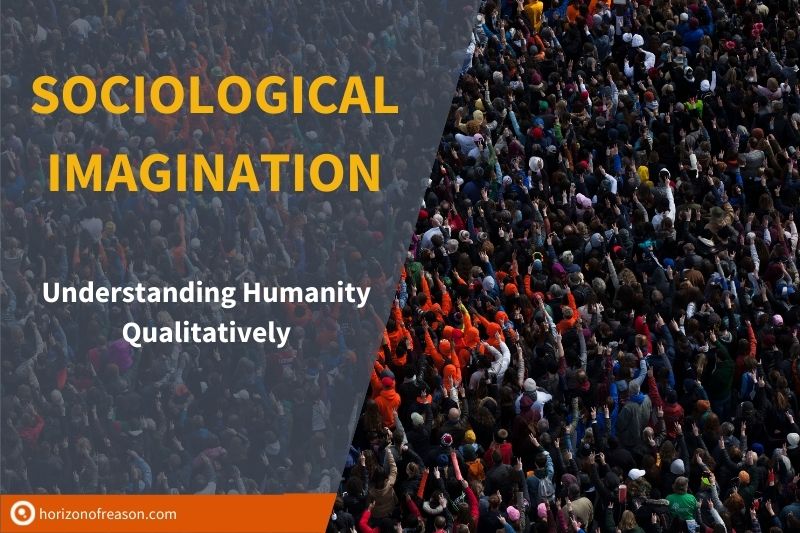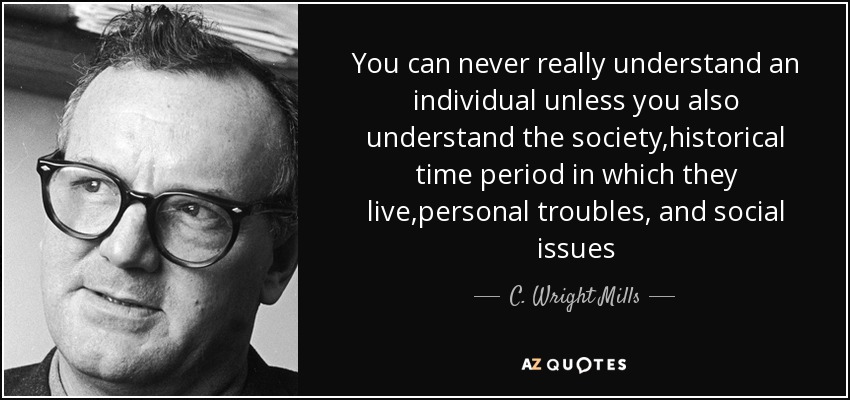
The Sociological Imagination of Mills: Lessons for Engineers

Peter Prevos |
762 words | 4 minutes
Share this content
American sociologist C. Wright Mills argued in his 1957 book Sociological Imagination that “nowadays men often feel that their private lives are a series of traps”. Mills maintained that people are trapped because: “their visions and their powers are limited to the close-up scenes of job, family [and] neighbourhood”. Many of us are not able to fully understand the broader sociological patterns related to their private troubles.
Underlying this feeling of being trapped are seemingly uncontrollable and continuous changes to society. Mills mentions unemployment, war, marriage and life in the city as examples where the tension between private trouble and public issues becomes apparent.

Examples of Sociological Imagination
The feeling that Mills identified in 1959 is still present today, and many examples can be found in popular media. One example is the tension that present-day women experience regarding their perceived housekeeping responsibilities, as discussed in a broadcast of Life Matters on Radio National in 2004. The discussion focused on the rising popularity of domestic advice and support services. In particular, the immensely popular American website Fly Lady (Cilley 2004), which provides advice to people (mainly women) who are not able to deal with their perceived roles as a homemaker.
Sociologist Susan Maushart argues that feminism has “thrown out the baby with the bathwater” (Radio National 2004) because, although the victories of feminism have ensured that women are not restricted to being homemakers, they have devalued the home in their wake. Many women thus feel, according to Masuhart, trapped between the social change achieved by feminism and the cultural expectations of being homemakers.
Mills offers a solution to this feeling of being trapped. He argues that because “neither the life of an individual nor the history of a society can be understood without understanding both”, we need to develop a way of understanding the interaction between individual lives and society.
This understanding is what Mills calls Sociological Imagination: the “quality of mind” which allows one to grasp “history and biography and the relations between the two within society”. Mills believed, however, that “ordinary people do not possess the quality of mind essential to grasp the interplay of man and society, biography and history, self and world”. Sociological Imagination is much more part of contemporary society than in the days when Mills wrote his book. Programs like Life Matters mainly deal with issues located on the crossroads between private trouble and the public sphere.
Many people do, however, not seem to be interested in developing the ‘quality of mind’ that Mills envisaged. They remain focused on personal issues, without realising the social reality in which the problems are embedded. This lack of Sociological Imagination becomes apparent when, for example, the issue of drug addiction is discussed in Australian media. An example of this is a report about the drug trade in schools in A Current Affair (2001). The issue was discussed without recognising the broader social issues relating to teenage drug addiction. The only solution offered to the problem in the program is ‘zero tolerance’. Some Sociological Imagination would go a long way in trying to find a solution to this problem.
Sociological Imagination for Engineers
Although society has changed since Mills first wrote his book, sociological imagination is still an essential skill in contemporary life.
In my professional life as an engineer, having sociological imagination helps me to understand the society I do my engineering for. When I first studied to be an engineer, I thought that sociological subjects were a waste of my time, which is an attitude still shared by many of my colleagues.
Through further study and self-reflection, I have learned that understanding people goes beyond the numbers that statistics provide. Engineers often deride the value of qualitative analysis as being subjective. But understanding people is all about understanding the deep subjectivity of the human experience. Qualitative methods provide a rich context that sits behind the numbers.
One of the initiatives I took to inject some more sociological imagination into the organisation I work for was to organise tap water taste testing events. These sessions not only provide numerical data of the subjective taste experiences that our customers have but most importantly, they offer the opportunity to meet customers and hear their stories about water.
Sociological imagination is still essential, especially in a world that is more and more retreating into so-called artificial intelligence. Developing sociological imagination is an investment in natural intelligence, which always has a much higher return on investment than what any machine can achieve.

Share this content


